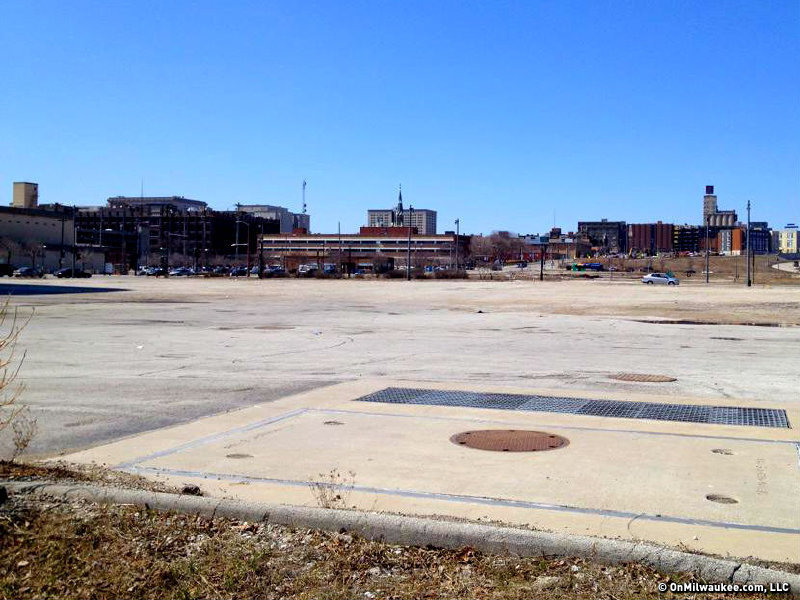There was a giant hand-holding session in Madison yesterday when a phalanx of politicians joined Gov. Scott Walker to announce that an agreement had been reached on the public commitment to help build a new arena in Downtown Milwaukee.
Walker took a break from his continual jaunt around the country to stand behind the microphone and announce the agreement. He was joined by so many people that it made your head swim. On hand were Mayor Tom Barrett, County Executive Chris Abele, State Sen. Scott Fitzgerald, the senate majority leader, and Rep. Robin Voss, the speaker in the assembly, and Sen. Alberta Darling, a co-chair of the powerful Joint Finance Committee, where the budget currently languishes – a budget that this arena thing is part of.
First let’s look at the information provided to the public about this agreement, and then we’ll take a look at some of the gigantic boulders that dot the road between here and the first game to be played in the new arena.
Here’s the story that was told today.
"We’ve considered the financial impacts on the state should the Bucks stay or go," Walker said, "and quite simply, we found it’s cheaper to keep them. Our plan is a result of a state and local, public and private alliance and it is developed with the goal of ensuring a good return to our state taxpayers. Under this plan, for every dollar the state invests state taxpayers will get a $3 return on that investment."
Walker said that if the team was relocated it would be a loss to state taxpayers of $419 million over the next 20 years due to the loss of current revenue, future growth and the ongoing costs to maintain the Bradley Center.
Here’s how this going to work:
- The state will put forward $4 million a year for 20 years with the total state investment capped at $80 million.
- The city will contribute $47 million through the creation of a tax incremental financing district and paying for a new parking structure in upfront cash.
- The county will contribute $4 million a year over 20 years by letting the state collect the county’s bad debts.
- The Wisconsin Center District will use existing revenue streams to finance roughly $93 million in bonding for the plan.
There’s an old joke that goes: "How can you tell when a politician is lying to you? His lips are moving."
I don’t think anybody up there with the governor was lying, but I think they have vastly underestimated how tough it’s going to be to sell this thing.
Let's be clear here that I strongly support the idea of public funding for an arena. I think the plans for development are outstanding and I think government should have a stake in the whole thing.
But there are nine serious roadblocks:
1. A majority of the state senators want the arena plan taken out of the budget and voted on as a separate item.
Many experts think that will give all the Republican senators who don’t give a hoot about Milwaukee, some cover. They can support the budget while voting against the arena plan.
2. Walker is incredibly distracted running for president.
He may say he makes calls to his office all the time, but a gone governor doesn’t have the kind of arm-twisting influence this thing needs. Plus, a lot of Republicans have already turned away from a man who may well leave the state pretty soon.
3. That whole Wisconsin District thing has the air of a fantasy about it.
Not one of the members of the board was at the negotiating table. The district gets about $30 million a year from taxes and spends about $20 million on debt service on the bonds it sold in 1996 to build the convention center. $6.5 million annually goes to pay Visit Milwaukee to aggressively market the city. There are going to be people on the board with serious reservations about this, especially since nobody bothered to ask them about it. Part of this also gives Abele much more power over the board, a move many think seals his attempt to get rid of long-time board president Frank Gimbel.
4. The extreme right wing of the Republican Party, aligned with the Koch brothers' Americans for Prosperity, is deadly opposed to this thing.
David Fladeboe, the state director for AFP, issued a statement saying, "the new Bucks proposal is a bad deal for Wisconsin taxpayers. Government shouldn’t be in the business of financing private sports stadiums. The current deal is based on fuzzy math, complicated accounting and millions of taxpayer dollars. (I never thought I’d agree with Americans for Prosperity, but that fuzzy math thing stands out.)
5. Labor leaders (who have less power than they think) want commitments to "family supporting jobs" written into the agreement.
Those labor folks can rally Democrats who may need rallying. There is already a lot of Democratic opposition, mainly because this is a Republican plan. If the plan becomes a separate issue, supporters may well need Democrats to chip in.
6. The Milwaukee Common Council needs to weigh in on the city's $47 million contribution.
The Council was left out of any of the negotiations and its members are going to want answers. This is a prime opportunity for them to emphasize their importance and how hurt they were by not being invited to the table.
7. There are some huge issues being dealt with by the Joint Finance Committee, including the cuts to education, the borrowing from the transportation fund and the prevailing wage law.
There are a lot of lawmakers who think those issues are a lot more important than an arena for the Bucks.
8. Can these numbers stand up to the scrutiny that will come?
It’s easy to put those numbers into a chart. But already there is significant question about whether the county contribution in the form of letting the state collect debts really is going to amount to $4 million for 20 years. And that $93 million from the Wisconsin Center District is going to depend on whether people who buy bonds are going to think this is a good buy.
9. I spent five years working in the state legislature. It is a nest of vipers, probably more now than it was a decade ago.
It’s not an exaggeration to say that while people in that building will smile at you one moment and then, behind closed doors will stick a knife in your back. And the idea of cooperation between state and local governments is as rare as snow in August. Government officials are also great at offering proposals that are clouded in details and charts and graphs. Many of them believe that you can, indeed, fool lots of people lots of the time.
With a history in Milwaukee stretching back decades, Dave tries to bring a unique perspective to his writing, whether it's sports, politics, theater or any other issue.
He's seen Milwaukee grow, suffer pangs of growth, strive for success and has been involved in many efforts to both shape and re-shape the city. He's a happy man, now that he's quit playing golf, and enjoys music, his children and grandchildren and the myriad of sports in this state. He loves great food and hates bullies and people who think they are smarter than everyone else.
This whole Internet thing continues to baffle him, but he's willing to play the game as long as OnMilwaukee.com keeps lending him a helping hand. He is constantly amazed that just a few dedicated people can provide so much news and information to a hungry public.
Despite some opinions to the contrary, Dave likes most stuff. But he is a skeptic who constantly wonders about the world around him. So many questions, so few answers.







